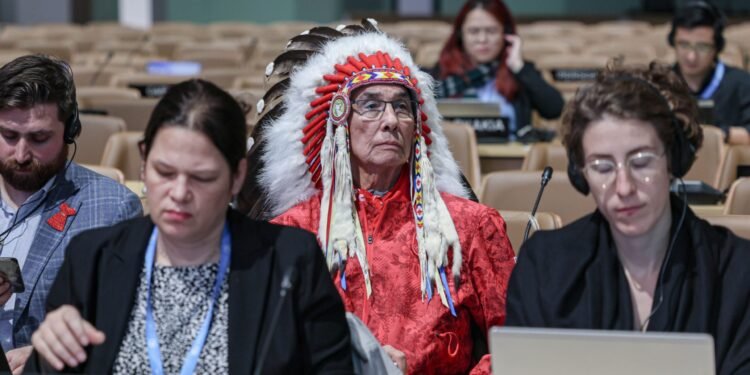The UK Climate Change Committee has warned of “limited” progress on global leaders reaching agreements around climate mitigation and adaptation at this year’s UN climate talks.
“COP29 came soon after the conclusion of the UN Convention of Biodiversity COP16… which, despite some progress, concluded without consensus on key issues such as finance and progress monitoring,” it said in its latest briefing.
“The UK has not yet submitted an updated National Biodiversity Strategy and Action Plan, as required under the Biodiversity Convention.”
The committee warned that this year is “certain to be the warmest year on record”, due to climate variability, with annual mean temperatures expected to be 1.5 degrees C higher than pre-1900 levels.
The 18 months to March 2024 were the wettest on record in England, with wet weather disrupting planting and harvesting in UK farming and eroding vegetable and fruit yields by 4.9% and 12%, respectively.
The World Economic Forum (WEF) has described biodiversity loss as the third most severe threat humanity will face in the next ten years.
“While COP16 and COP29 have distinct focuses, both conferences demonstrated the growing recognition of the interconnected nature of biodiversity and climate challenges,” Ben Goymer, head of renewable energy at sustainability reporting platform NatureMetrics, told Energy Voice.
“With over half of the world’s GDP being dependent on nature, restoring our ecosystems is vital in the fight against climate change. Biodiversity loss exacerbates climate change by degrading ecosystems that act as carbon sinks, reducing nature’s ability to mitigate global warming.”
‘Do better’
The Climate Change Committee, which reports progress on climate adaptation to parliament every two years, will update the pathway towards net zero in the UK’s seventh carbon budget advice, which outlines action needed to meet 2030 contributions targets, as well as 2035 targets.
The committee has called for the third National Adaptation Programme to be “strengthened” in line with the new global adaptation framework and aligned with the UK’s commitments on biological diversity.
In a recent broadcast on BBC Question Time, Emma Pinchbeck, who was appointed chief executive of the Climate Change Committee in November, told government to “do better”.
She warned that in sticking to fossil fuels, the country will be “left behind, where the economy is going”.
“The UK’s target and record of tackling emissions and adapting to climate change provides a powerful example… only if the policies to achieve its targets are in place and supporting delivery,” said Professor Piers Forster, interim chair of the Climate Change Committee.
UK ministers have committed to a nationally determined target to reduce emissions by 81% through 2035, outlined in the Climate Change Committee’s recommendation in October, and are required to make a formal submission next year.
‘Real shift’
Since the UN convention on biological diversity in 2022, when the Kunming-Montreal Global Biodiversity Framework was adopted, there has been a “real shift towards nature-positive objectives”, Goymer said.
The new framework has led to a “significant increase in corporate representation”, including energy companies Iberdrola, Orsted and Anglo American.
Ovo Energy, Drax and Celsia Colombia are among energy companies that have pledged to make financial disclosures in their annual corporate reporting, as early adopters of the Taskforce on Nature-Related Financial Disclosures.
However, Goymer warned that only 1% of companies reported properly on climate change, water security and deforestation: “Nature-monitoring technology will be key to addressing this gap.”
EDF Renewables recently partnered with Natural Power and NatureMetrics for an 18-month study on offshore wind monitoring at the Blyth Offshore Demonstrator wind farm that reduced vessel time by 40%.
The study showed that monitoring aquatic life using the eDNA tool identified 70% more fish species compared to traditional methods and eliminated safety risks posed by trawling near turbine structures.
“The increase in renewable energy targets will be accompanied by an inevitable increase in the construction of new energy plants and projects, which will require understanding how this new infrastructure impacts biodiversity around those sites,” Goymer said.
In 2020, the WEF estimated that half of the threat to biodiversity comes from changes in land and sea usage, 7% from direct pollution and 6% from climate change. It estimates that half of the global economy is under threat from biodiversity loss.
“2024 saw anomalously strong hurricanes, rainfall events, wildfires and heat waves,” the Climate Change Committee said in its latest report.
A “critical outcome” of this year’s climate talks was the new collective quantified goal, which Goymer said has the potential to triple funding for nature by 2030 “with direct implications for biodiversity conservation”.
The new funding target is expected to boost investment in clean energy, “put pressure on fossil fuel firms to diversify” and “catalyse private sector funding for sustainable projects”, he said.
Integrating biodiversity into project design, creating environments that share space with nature, and reducing urban sprawl, are among five key recommendations from the WEF.
‘Fourth industrial revolution’ technologies could transform urban utilities, creating a business opportunity of $585 billion and 29 million new jobs by the end of this decade.
However, as with carbon market reporting, there remains a lack of standardisation within climate reporting.
The Climate Change Committee warned that countries are making progress on adaptation planning too slowly, with 13% lacking national adaptation plans.
This year’s fund for mitigation and adaptation remains small at $759 million relative to the estimated need, while talks on other aspects of loss and damage, including governance, were deferred to 2025.
Recommended for you










